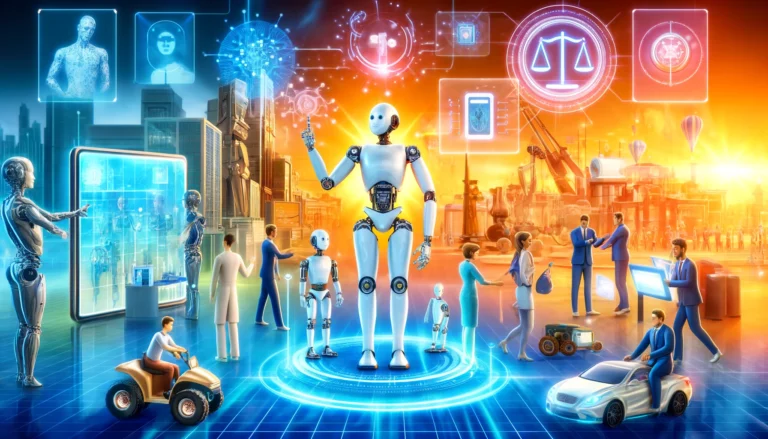Exploring the Latest Advancements and Applications in AI
As we venture into 2024, the landscape of artificial intelligence (AI) continues to evolve at a breathtaking pace. This year promises groundbreaking advancements and innovative applications that will profoundly influence various sectors. From healthcare to transportation, AI’s integration into our daily lives is becoming increasingly apparent. In this article, we delve into the latest trends in AI, exploring their applications, ethical considerations, and future implications.
AI in Healthcare: Revolutionising Patient Care
One of the most exciting areas where AI is making significant strides is healthcare. AI-driven technologies are enhancing patient care, streamlining operations, and improving diagnostic accuracy. Machine learning algorithms are now capable of analysing vast amounts of medical data, leading to earlier detection of diseases and personalised treatment plans.
For instance, AI-powered diagnostic tools can identify abnormalities in medical images with higher accuracy than human radiologists. This not only speeds up the diagnostic process but also reduces the likelihood of errors. Furthermore, predictive analytics in healthcare enables clinicians to anticipate patient outcomes and intervene proactively, thus improving overall patient care.
AI is also transforming surgical procedures. Robotic surgery systems, guided by AI, offer precision that surpasses human capabilities, leading to fewer complications and faster recovery times for patients. The integration of AI in telemedicine is another noteworthy trend, providing remote consultations and continuous monitoring, which is especially beneficial in underserved areas.
AI in Education: Personalised Learning Experiences
The education sector is witnessing a significant transformation due to AI. Traditional teaching methods are being augmented with intelligent tutoring systems that provide personalised learning experiences. These systems adapt to individual students’ learning styles and paces, ensuring that each student receives tailored instruction.
AI-driven educational platforms utilise data analytics to monitor student performance and identify areas where they need additional support. This data-driven approach enables educators to provide targeted interventions, thereby enhancing the learning outcomes. Moreover, AI is facilitating the creation of interactive and immersive learning environments through technologies like virtual reality (VR) and augmented reality (AR), making education more engaging and effective.
Language learning is another area where AI is making a considerable impact. Natural language processing (NLP) algorithms power language translation and voice recognition systems, enabling students to practice and improve their language skills in real-time.
AI in Industry: Enhancing Efficiency and Productivity
Industries across the board are leveraging AI to enhance efficiency and productivity. In manufacturing, AI-powered automation is streamlining production processes, reducing downtime, and improving product quality. Predictive maintenance systems, which rely on AI algorithms, can foresee equipment failures before they occur, thereby minimising costly disruptions.
Supply chain management is another domain benefiting from AI. By analysing historical data and real-time information, AI systems optimise inventory levels, predict demand fluctuations, and manage logistics more effectively. This not only reduces costs but also ensures timely delivery of goods.
In the financial sector, AI-driven algorithms are revolutionising trading and investment strategies. These algorithms analyse market trends and execute trades at speeds unimaginable for human traders, maximising returns and minimising risks. Additionally, fraud detection systems powered by AI are becoming more sophisticated, providing enhanced security for financial transactions.
AI and Ethical Considerations: Navigating Complex Challenges
As AI technologies become more pervasive, ethical considerations are paramount. Issues such as data privacy, bias in AI algorithms, and the impact of AI on employment need to be addressed to ensure that AI is developed and deployed responsibly.
Data privacy is a significant concern, given the vast amounts of personal information that AI systems process. It is crucial to implement robust data protection measures to safeguard individuals’ privacy. This includes adhering to regulations such as the General Data Protection Regulation (GDPR) and ensuring transparency in data collection and usage practices.
Bias in AI algorithms is another critical issue. AI systems are only as good as the data they are trained on. If the training data is biased, the AI outcomes will also be biased. Addressing this requires a concerted effort to ensure diverse and representative data sets, as well as continuous monitoring and adjustment of AI algorithms.
The impact of AI on employment is a topic of much debate. While AI has the potential to create new job opportunities, it also poses the risk of job displacement, particularly in sectors reliant on routine tasks. It is essential to develop strategies for upskilling and reskilling the workforce to adapt to the changing job landscape.
AI in Transportation: Paving the Way for Autonomous Vehicles
The transportation sector is on the cusp of a revolution with the advent of autonomous vehicles. AI technologies are enabling self-driving cars to navigate complex environments, making transportation safer and more efficient. These vehicles rely on a combination of machine learning, computer vision, and sensor fusion to interpret their surroundings and make real-time decisions.
Autonomous trucks are also gaining traction, promising to revolutionise the logistics industry by reducing delivery times and lowering operational costs. Moreover, AI-driven traffic management systems are being implemented in cities to optimise traffic flow, reduce congestion, and minimise emissions.
The Future of AI: Opportunities and Challenges
The future of AI holds immense promise, but it also presents several challenges. On the one hand, AI has the potential to drive innovation, enhance productivity, and improve quality of life. On the other hand, it raises complex ethical, legal, and social issues that need to be addressed.
AI governance is crucial to ensure that AI technologies are developed and used in a manner that is ethical, transparent, and accountable. This includes establishing standards and guidelines for AI development, as well as fostering collaboration between governments, industry, and academia.
AI research must continue to advance, focusing on areas such as explainable AI, which aims to make AI decision-making processes more transparent and understandable. Additionally, efforts should be made to ensure that AI benefits are equitably distributed, avoiding exacerbation of existing inequalities.
In conclusion, the emerging trends in AI for 2024 highlight the transformative potential of this technology across various sectors. From revolutionising healthcare and education to enhancing industrial efficiency and paving the way for autonomous transportation, AI is set to play a pivotal role in shaping our future. However, it is imperative to address the ethical and societal implications of AI to ensure that its development and deployment are aligned with our collective values and goals.


